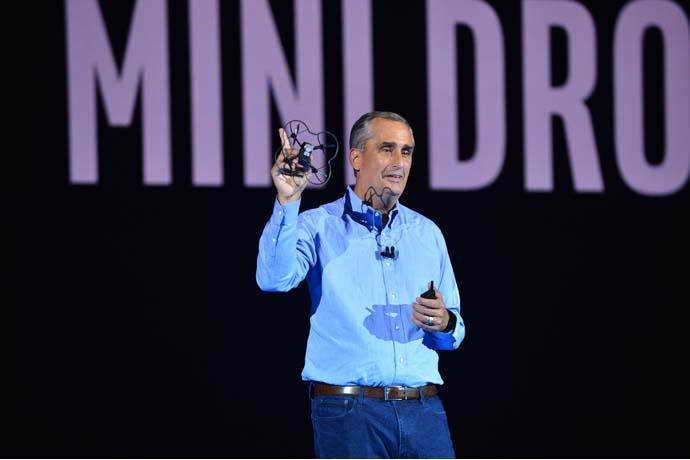
Intel Corp. CEO Brian Krzanich displays a Shooting Star Mini drone during the 2018 Consumer Electronics Show (CES) preshow keynote address Monday, Jan. 8 in Las Vegas. Photo courtesy of Intel Corp.
Aside from obtaining a Guinness World Records title for most unmanned vehicles airborne simultaneously from a single computer indoors, Intel CEO Brian Krzanich’s keynote speech included a discussion for what’s next in the data revolution. Drones, after all, are a product of data. So too would be an applicable urban mobility ecosystem, quantum computing and the need for data security.
He brought up data security first during the Consumer Electronic Show pre-show kickoff in Las Vegas Monday. In the wake of two computer processor security vulnerabilities being brought to light, called Meltdown and Spectre, the speech started by addressing the issues as an industry-wide obstacle.
“The collaboration among so many companies to address this industry-wide issue across several different processor architectures has been truly remarkable. Security is job No. 1 for Intel and our industry. So, the primary focus of our decisions and our discussions have been to keep our customer’s data safe,” Krzanich said. “As of now, we have not received any information that these exploits have been used to obtain customer data. And we are working tirelessly on these issues to ensure it stays that way.”
He went on to mention that the best way to maintain security is to update the operating system whenever able. Intel expects to issue updates for more than 90% of its products within a week and rest by the end of the month, Krzanich said.
The rest of his speech focused on innovation and the not-so-distant future of data-driven technology.
By 2020, he said, every person will contribute a large amount of data per day. And even larger than the output of a single person is the data output of an autonomous car. By 2020, Krzanich said one could generate four terabytes each day. But there are two generators greater than that.
“A connected airplane will generate about 40 terabytes a day,” Krzanich said. “And a smart factory will generate one petabyte of data — one petabyte of data — per day. That’s the equivalent of 700,000 people.”
Furthermore, he continued later in his speech, Intel is working on quantum computing. Intel has been working with Delft University of Technology in the Netherlands to build full quantum computing systems, he said. Although Intel has its 7- and 17-a systems, Krzanich had another to unveil to the audience.
“I’m proud to introduce to you our 49-qubit quantum chip. It is a step toward quantum supremacy — a point at which quantum computers far and away surpass the world’s best supercomputers,” he said. “We expect to solve key technical challenges that must be overcome to move quantum computing forward. There’s quite a bit more work required than just this chip, but this is a major breakthrough in quantum computing.”
Krzanich said Intel believes quantum computing would have the greatest impact on areas like material science. Quantum computing could aid in the discovery of new materials, Krzanich said, like superconductors and new molecules for pharmaceuticals.
“The future of both neuromorphic and quantum computing are coming much faster than anyone imagined,” he said. “And I’m confident that [will] transform our lives for the better. The next generation of computing will be more than about technology. It will also focus on how the industry positively impacts society.”
Also supposedly on the cusp is the rise of urban mobility, accessible to the general commuting public. Krzanich flew solo in what could be a future air taxi, as shown on a video he played during his speech.
German startup e-volo’s Volocopter uses the same flight technology that Intel’s Falcon 8+ drone does, Krzanich said, bringing e-volo’s CEO Florian Reuter on stage. E-volo aims for complete autonomy, and so far, the ride is smooth. The Volocopter achieved first flight in 2016, and Krzanich described his flight as “the smoothest, funnest ride” he’d ever experienced.
“That achievement [first flight] was a true milestone in aviation history. We hit yet another milestone about four months ago when conducting the first-ever flight of an autonomous air taxi in the city of Dubai,” Reuter said. “And I can tell you there were numerous approval authorities involved in approving that stunt. Soon we will offer autonomous air taxi flights as a service in cities across the world revolutionizing the way we all experience urban mobility today. And the best [thing] about it? It has the potential to be affordable for all of us.”
He asked, who wouldn’t want to fly across the city and view it from above while saving time and skipping traffic? Although a rhetorical question, Krzanich answered it after his Volocopter landed.
“Everybody will fly one of these someday,” he said.